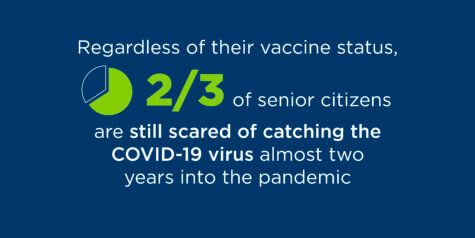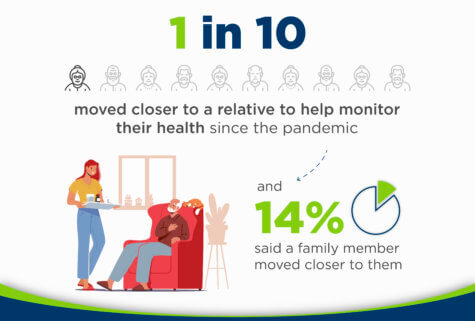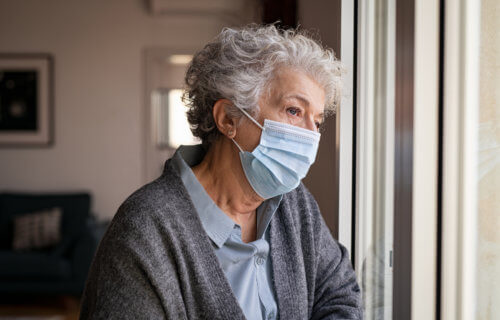NEW YORK — Regardless of their vaccine status, two-thirds of senior citizens are still scared of catching COVID-19 almost two years into the pandemic. That’s according to a recent study of 2,005 Americans over 65 that explored their post-pandemic concerns about maintaining health.
 The survey, carried out by OnePoll for AmeriLife, also showed that 57 percent are more cautious of getting sick or injured now compared to before the pandemic. Nearly four in five seniors (79%) say the pandemic has renewed their sense of how important maintaining health is in their older years.
The survey, carried out by OnePoll for AmeriLife, also showed that 57 percent are more cautious of getting sick or injured now compared to before the pandemic. Nearly four in five seniors (79%) say the pandemic has renewed their sense of how important maintaining health is in their older years.
Unassisted living
To stay on the safe side, one in 10 seniors has moved closer to a relative since the start of the pandemic, while almost one in seven (14%) say a family member moved closer to them. Though that hasn’t stopped a majority from keeping their independence — 50 percent have managed their health on their own and 64 percent have handled their day-to-day errands by themselves.
In fact, nearly half of respondents over 75 reported taking care of their own daily tasks rather than relying on others (46%).
When it comes to deciding on their preferred health care plans, seven in 10 older Americans also have taken charge of making these decisions, though women (74%) are more likely to do this than men (65%).
“While the past 18 months have been challenging for everyone, seniors in particular have shown a resiliency and determination that has long been a hallmark of their generation,” says Scott R. Perry, CEO of AmeriLife, in a statement. “We believe that we have an obligation to educate and empower them to make decisions for their health and financial well-being on their terms, while also ensuring they can continue to have control over — and we can support — these critically important life decisions.”
Senior health journey during COVID
 When it comes to monthly health care expenses, senior men ($352) also pay more for services than women ($260). This amounts to women spending $1,101 less than men do on yearly health-related bills.
When it comes to monthly health care expenses, senior men ($352) also pay more for services than women ($260). This amounts to women spending $1,101 less than men do on yearly health-related bills.
Fifty-three percent face obstacles in navigating their health care. For example, one in five cited the anxiety of being taken seriously when making a doctor’s appointment. Nearly the same number (19%) fear the discovery of a serious illness.
That may be why more seniors are taking their health into their own hands, as 42 percent of current policyholders say they’re willing to do online research before making a health insurance purchase.
However, the majority (53%) say they’d be willing to purchase health insurance online only if a licensed agent helped them.
“The value of human connection has never been more important, particularly considering the impact of the pandemic,” says Mike Vietri, chief distribution officer at AmeriLife. “Similarly, the value of a dedicated insurance agent has never been higher. Today’s best agents are educators and advocates for their clients, with access to the right technology and innovative insurance solutions that help those approaching and in retirement to make the most informed decisions for themselves and their families.”
